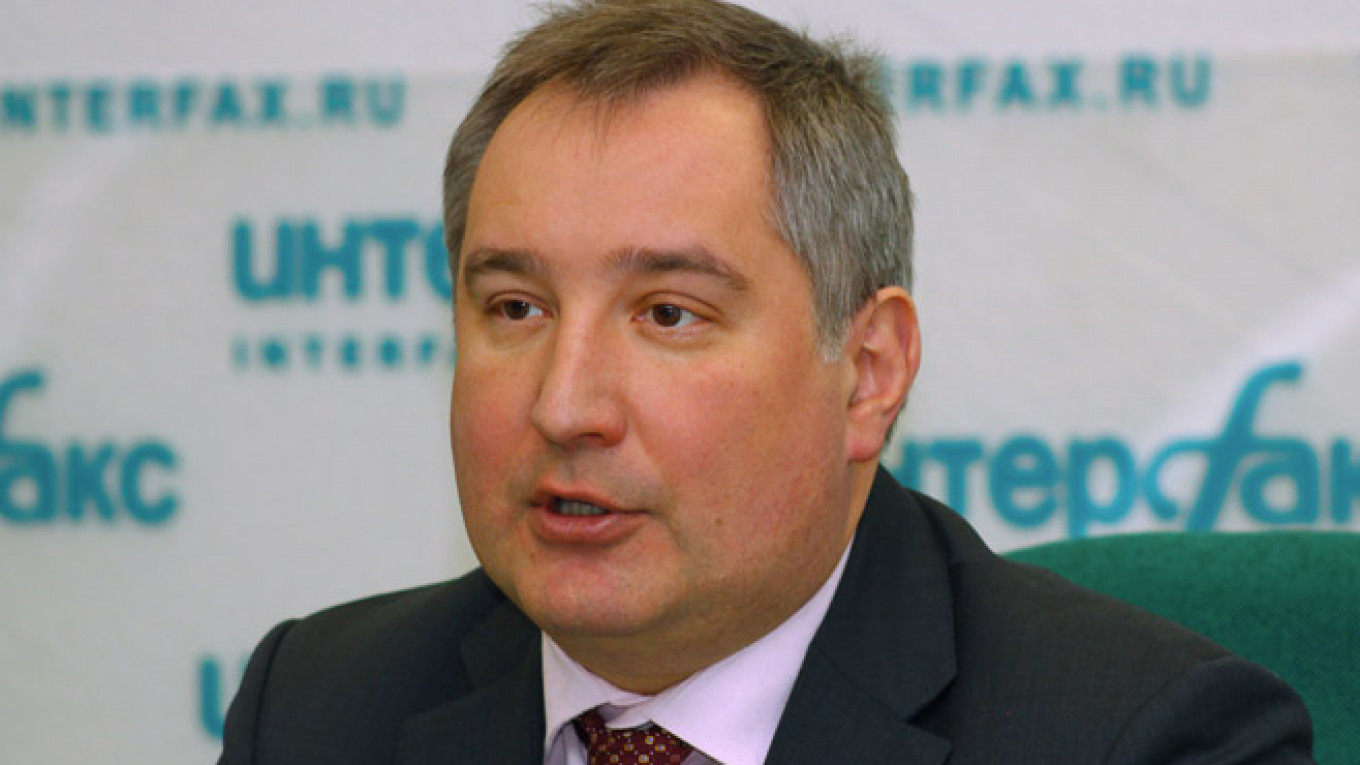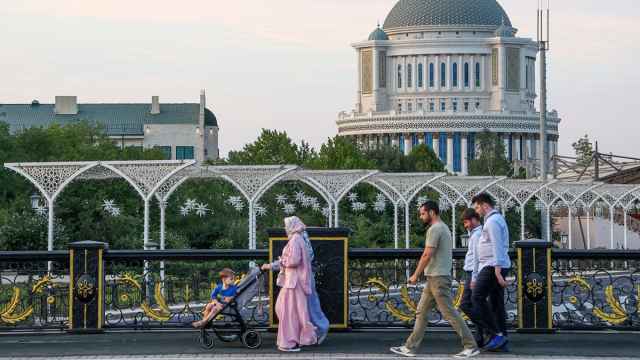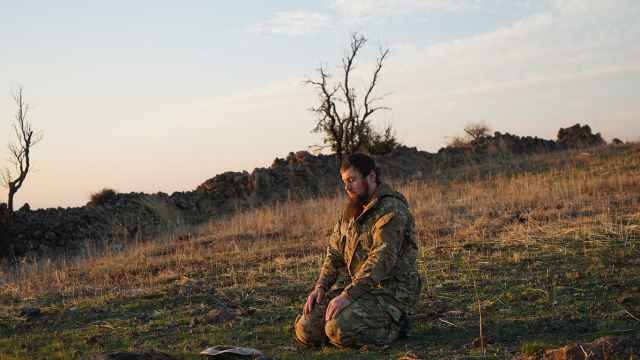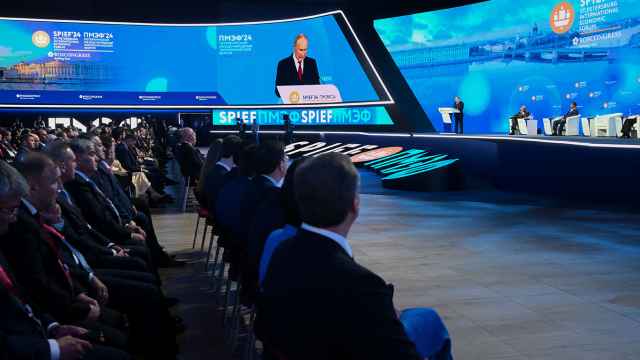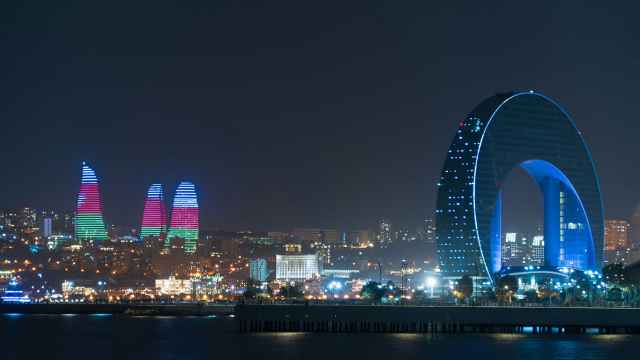Deputy Prime Minister Dmitry Rogozin on Friday attended the Victory Day parade in Tiraspol, the capital of Moldova's self-proclaimed Transdnestr republic, and left with more than 30,000 signatures from locals demanding unification with Russia.
The visit coincided with President Vladimir Putin's appearance in Crimea — annexed to Russia after a similar collection of signatures — and came shortly before several referendums on secession from Kiev were held in various cities in eastern Ukraine on Sunday.
Rogozin's visit, perhaps a nod to members of the Transdnestr parliament who in March asked Russia's State Duma to annex the breakaway republic, was seen by some analysts as a sign of Russia trying to retain influence.
"What Putin wants to do is to create an additional source of tension in this area, which will preserve Russia's influence there," said Alexander Morozov, a Moscow-based political scientist.
"The same is true for Ukraine's east, so we should be aware of this scenario," he said in a phone interview.
Echoing comments made by Putin himself ahead of the annexation of Crimea, Rogozin spoke out on behalf of protecting the Transdnestrian population.
"Russia, as a guarantor of peace and stability on the Dnestr river, will do everything to prevent the isolation of Transdnestr," Rogozin said Friday.
"We are not only observing this situation — as things develop we can take necessary steps," he said, Itar-Tass reported.
Both governments in Kiev and Chisinau expressed their discontent with Rogozin's visit, with the former keeping him out of its airspace and the latter searching his plane.
On the way to Moldova, Rogozin had to fly via Bulgaria and Romania in order to avoid Ukraine's airspace, since he is included on the list of Russian officials blacklisted by the U.S. and the European Union over the Ukraine crisis.
"Thank God Ukraine is not Russia, or we would have to fly around for 20 hours," Rogozin joked on Twitter on Thursday.
On the way back, Romania closed its airspace to Rogozin's plane, prompting him to take a regular scheduled flight to Moscow's Domodedovo Airport.
Rogozin reacted to the move with a joke about using a bomber jet the next time around.
"Next time I will fly on a Tu-160 jet," he wrote on Twitter.
The comments only infuriated Romania's Foreign Affairs Ministry, which called Rogozin's remarks "a serious threat" and demanded that authorities in Moscow "provide public clarification on whether the statements made by Deputy Prime Minister Rogozin are the official position of the Russian Federation with regard to Romania as a member state of the EU and NATO."
The Moldovan police also searched the charter plane with Russian State Duma deputies who had been traveling with Rogozin.
State Duma deputy Alexei Zhuravlyov, a member of the Russian delegation, expressed indignation over the incident.
"They rushed into the aircraft and searched our belongings. It seems that the Moldovan republic is pushing Russia to act," Zhuravlyov told The Moscow Times by phone.
Despite Moldova's actions, Zhuravlyov said Russia has no plans to absorb Transdnestr, as there is no threat to the more than 200,000 Russian citizens there.
Gennady Konenko, head of the Moldova and Transdnestr department at the Moscow-based Institute for CIS Studies, echoed Zhuravlyov's comment.
"The problem is that we do not have a common border with Transdnestr, and we do not feel that our citizens there are under threat," Konenko said.
Zhuravlyov did not exclude the possibility of the situation in Transdnestr worsening in the wake of the Ukraine crisis, however.
"If Ukraine or Moldova will attempt to isolate Transdnestr though, they must have no doubt that Russia will use all necessary means to unblock this territory," said Zhuravlyov, who chairs the Eurasian Integration Organization, which offers Russian humanitarian aid to Transdnestr.
With the referendums in eastern Ukraine paving the way for the region to secede from the government in Kiev, Transdnestr may serve as an example for eastern Ukraine to follow, analysts said.
"If these regions will manage to defend their independence, then it is possible that they will model themselves after Transdnestr," Zhuravlyov said.
Transdnestr, officially a region of Moldova, declared its independence in 1990, though its sovereignty has not been recognized by any United Nations states, including Russia, and it has largely been considered to be engaged in a "frozen conflict" with Moldova ever since then.
Despite not officially recognizing the breakaway region, located on a narrow strip of land between the Dnestr river and Moldova's border with Ukraine, Russia has helped the region both financially and militarily, stationing 1,200 servicemen in the area.
Since 1999, Russia has also been distributing Russian passports among residents of Transdnestr. Today, more than a third of the population possesses dual citizenship.
Zhuravlyov said Russia had contributed 5 billion rubles for the construction of kindergartens, hospitals and other social infrastructure as part of its Eurasian Integration program in the region.
Contact the author at [email protected]
A Message from The Moscow Times:
Dear readers,
We are facing unprecedented challenges. Russia's Prosecutor General's Office has designated The Moscow Times as an "undesirable" organization, criminalizing our work and putting our staff at risk of prosecution. This follows our earlier unjust labeling as a "foreign agent."
These actions are direct attempts to silence independent journalism in Russia. The authorities claim our work "discredits the decisions of the Russian leadership." We see things differently: we strive to provide accurate, unbiased reporting on Russia.
We, the journalists of The Moscow Times, refuse to be silenced. But to continue our work, we need your help.
Your support, no matter how small, makes a world of difference. If you can, please support us monthly starting from just $2. It's quick to set up, and every contribution makes a significant impact.
By supporting The Moscow Times, you're defending open, independent journalism in the face of repression. Thank you for standing with us.
Remind me later.


